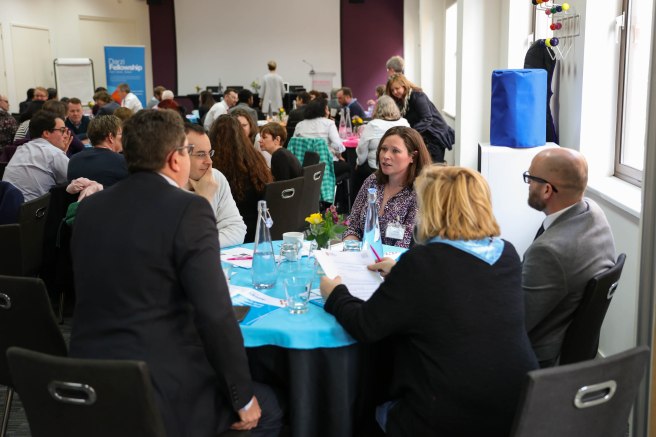I am repeatedly asked about Communities of Practice – how to convene them, so here is a quick guide.

Communities of Practice
Communities of Practice as a concept is relatively new in the NHS, but as a learning approach is more recognized in the corporate world. You might recognize the term ‘Learning Network’ which is used more frequently for the same type of approach.
“Communities of practice are groups of people who share a concern or a passion for something they do and learn how to do it better as they interact regularly.” Wenger-Trayner 2015[1]
There are three key Characteristics of CoPs:
- The Domain of Interest – where there is shared competence between peers, in relation to a specific practice. This is not about strategy or other people’s work, it is about the granularity of the CoP member’s work. Members are passionate about the issue, they come together because they care about it.
- The Community – with members who help each other in service to their domain of interest, though sharing knowledge and experience. The key here is repeated interaction and supportive learning relationships. There is depth to these interactions that includes reflective skills.
- The Practice – practice in this context means creating meaning (why we do this work together), creating coherence (how we do our work together), and for learning (what works and why – and how do new members learn about our work). Practice is the application of knowledge, and in this process this practice is shared, i.e. all members are developing their shared approach
Malby and Fischer 2006 ; Wenger-Trayner 2015
Critically therefore CoP member instigate and join a CoP because:
- They care about the domain
- They have shared competence and practice
- They want to learn together how to develop their practice (at a detailed competence level).
Communities or Practice are knowledge seeking, both from the tacit knowledge within the members , and as all learning networks, by seeking out knowledge about their shared domain and practice. (looking for best practice, published evidence).
Principles of Communities of Practice
The basic principles for communities of practice are:
- Participation – everyone in the community has a voice, can be heard and can contribute to the practice. Difference explored.
- Commitment to practice – to uncovering what the work it, why we do it, how its done, and to reciprocity with others wanting to learn.
- Understanding boundaries and scale – what works here and does it change as the scale changes for instance if the boundary to the community changes.
- Reflection using evidence-based conversations as a core practice in itself.
- Creativity as a source of energy for practice – using imagination, permission to explore, finding new ways of exploring work.
So Communities of Practice are networks of members committed to learning how to do the best they can in their domain of interest creating relationships for learning and development, and clarifying what information needs to be generated and shared across the community.
(Malby and Fischer 2006)
The CoP Process
Communities of Practice like all networks need nurturing. There is usually someone who takes the lead in setting one up – because they care about the issue enough. They invite colleagues to learn together. There are two types of convening that take place:
- The lead member in the CoP who takes the role of a network leader – being a good host, bringing members together, making sure the conversations are adding value to everyone, helping members work well together. Here the network leader facilitates the CoP process
- A facilitator. Where there are a number of CoPs taking place, these might happen in the same space, in which case a facilitator can be helpful in supporting the process of the learning conversation – bringing in an element of reflection and review, and helping the CoP sustain the principles of shared learning and the focus on practice.
Once established CoPs are often self-organising.
The learning conversations take an inquiry approach – working together to deepen the members understanding of practice, seeking out the best evidence to help them improve their practice (in relation to their domain of interest).
They interact regularly. Once the first meeting or two has taken place CoPs usually ‘take off’ with members talking online as well as face to face. CoP members often go visit each other’s place of work to deepen their understanding of practice; they might set up a knowledge sharing platform (Trello, Slack) or a space to chat together e.g. a What’s App group or Linked In Group, so they can talk between meeting up. They will be sharing resources (e.g. protocols; articles).
The Success of CoPs
One of the key principles in terms of the success of CoPs is: ‘You own what you create’ (Rodgers M (2016) )
As with all networks CoPs will thrive if:
- There is clear shared purpose and identity
- They are creative and innovative
- They meet member needs
- They are supported by adapted leadership
- They have strong relationships and ties
- They generate helpful outputs
(Malby and Anderson Wallace 2016)
Critical to this at the outset of a CoP is to determine how to track impact – what are members learning, how are they applying that and what difference is it making. In effect members need to be able to answer the question ‘So What’?
Convening
Convening CoPs isn’t difficult, the biggest issue for the NHS is that this is an unfamiliar conversational learning process in an NHS dominated by hierarchy and project management. The convenor needs the following:
- Knowledge
- The difference between CoPs and other group learning processes (e.g. Action Learning Sets) or group project delivery processes (Task and Finish groups)
- What a CoP entails, the design and trajectory of CoPs
- How to lead a network approach to learning
- Skills
- Reflective and Reflexive Practice
- Facilitating groups to hold onto the key principles of a CoP for instance how to support CoP groups as they form to ensure everyone participates. These are basic organisational development and group facilitation skills, but the work here is knowing which of this broader set of skills apply to CoPs.
- Securing impact – how to gather data on and demonstrate CoP impact
The best way to learn about convening CoPs is to:
- Secure a good understanding of the process (read all about it, talk to people who have done it)
- Start the work of convening a CoP and review your practice as a convenor
References
Malby B, Anderson Wallace M (2016) Networks in Healthcare- Managing complex relationships. Emerald.
Malby & Fischer (2006): Tools for Change: An Invitation to Dance. Kingsham Press.
Roger M (2016) in South London Health Innovation Network. Health Innovation Network London (2016) Patient Safety Communities of Practice at HIN: Leading Change Across System Boundaries
Wenger –Trayner E and B (2015) Introduction to Communities of Practice
[1] Etienne Wenger is a thought leader in this field and has published and facilitated this approach around the world over many years. It is worth reading his work either in text or on his website.

Thanks Becky.
A useful resource to share.
LikeLike
Thank you for this piece, its really helpful. Wonder if you might help me understand a bit more on ‘reflection using evidence-based conversations as a core practice”?
LikeLike
Sorry liz I missed this comment
LikeLike